Watch out for the Festive Fear, as new research highlights the pressures of the festive season
When Christmas comes around, the Festive Fear can compound the risk of injury or harm, as the pressure to host the perfect Christmas mounts.
We commissioned new research to shine a light on the seasonal stress, or “festive fear”, many of us feel in the run up to Christmas, and the injuries suffered as we rush to prepare for the celebrations.
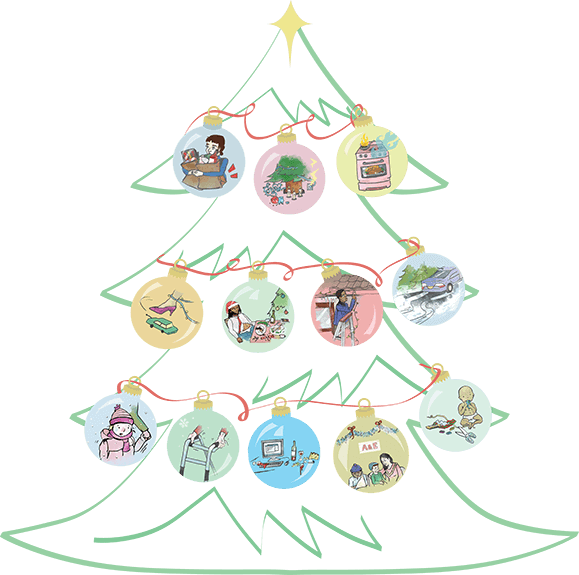
The study of 2,000 people shows that 1 in 4 (27%) feel more stressed than usual during the festive period, rising to nearly a third (32%) among women.
It appears the pressure to cook and host are the biggest stress factors, with more than 1 in 10 women (13%) and only 6% of men feeling the pressure when cooking.
Almost 1 in 5 people (18%) find a busy home overwhelming and a quarter admit their home is messier than usual. Amidst this panic and bustle, 1 in 5 women and 1 in 10 men (12%) say they are more likely to do things in a rush.
During this busy time of year, the Festive Fear, and rushing, can lead to mistakes and accidents happening.
What does the Festive Fear mean in numbers?
What does the Festive Fear mean in numbers?
These are just some of the mishaps our survey uncovered:
- Nearly half (49%) of those preparing Christmas food have suffered an accident
- 1 in 10 (11%) have spilled hot fat on themselves when cooking
- Nearly 1 in 5 (18%) have cut themselves preparing vegetables
- More than 1 in 40 (2.7%) people have suffered an electric shock due to badly wired Christmas lights
- 1 in 50 (2.1%) have fallen out of the loft while getting decorations down
- Nearly a third (32%) of people have fallen on ice
- 8% of those aged 16-24 have had to make a trip to A&E during the festive season
Although many Christmas accidents are quickly shrugged off, more than 80,000 people a year need hospital treatment for injuries such as falls, cuts and burns during the festive period, according to the NHS.
From our survey results, it was also estimated that over the Christmas period:
- There have been 400,000 burnt Christmas turkeys
- 500,000 people have had a gas leak or gas emergency in the home
- Half a million people have had a fire in the home
- 2.6 million people have fallen off a stool or ladder while hanging up decorations
- 600,000 people have burned themselves roasting chestnuts over an open fire
- 700,000 people have been injured in a sale rush when shopping
There are several elements which combine to create extra risk at Christmas, including winter weather, stress and rushing about and, in particular, excess alcohol as we mark the festive season at office parties and other celebrations.
Accidents within the home
- Every year, about 1,000 people are injured by their Christmas tree, usually while fixing decorations to the higher branches (RoSPA)
- Around 350 people a year are hurt by Christmas tree lights (RoSPA)
- People are 50% more likely to die in a house fire over Christmas than at any other time of the year (RoSPA)
- One in six fire deaths in 2010 occurred in December (government figures)
- Between 1997 and 2010, 26 people died in the UK from watering their Christmas tree with the lights on (RoSPA)
Accidents while out and about
- Traffic accidents are much higher in December than any other month of the year, up around 30% for women, and 9% for men (ONS data)
- Accidental falls in December are up 16% for women and 21% for men (ONS data)
- Accidents due to natural and environmental factors, such as exposure to cold or flooding, rise significantly in December and January, up about 103% for women and 145% for men (ONS data)
Christmas and alcohol
- Over 600 million units or 265 million pints of pure alcohol are drunk by Brits each December (DrinkAware, 2009)
- Almost half of Britons say they expect to drink more than the recommended daily units of alcohol, which is two to three for women and three to four for men (DrinkAware, 2009)
Christmas Safety Tips
With our survey results in mind, we've compiled tips and advice to help prevent some of the most common accidents and Christmas injuries.
Electrical and fire safety at Christmas
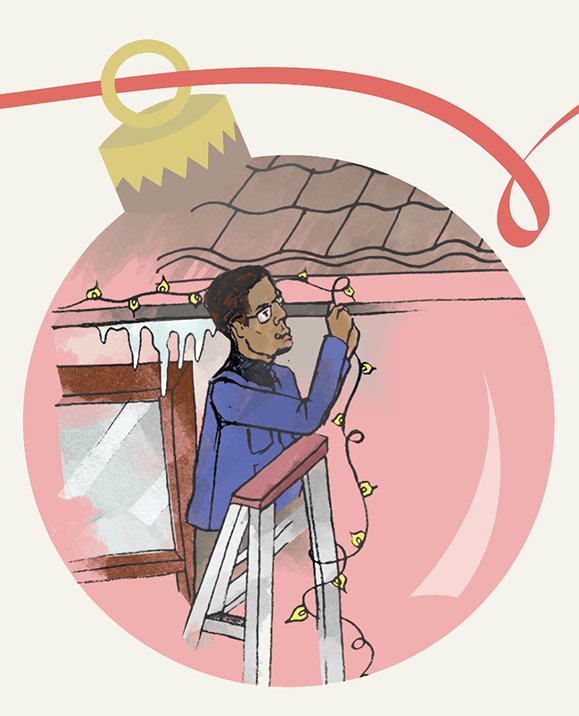
- Check your fairy lights and any other electrically powered Christmas decorations over before putting them up. If cables are frayed or fittings damaged in any way, dispose of them.
- Switch all lights and electrical decorations off at night and when you go out.
- Always unplug lights before watering the Christmas tree
- Check that any lights being used outside are safe and designed for external use - and keep plugs and transformers indoors
- Don't overload electrical sockets. At this time of year it can be tempting to plug extension cables into each other, but this can lead to overheating and electrical fires
- Keep Christmas cards and decorations away from lights, heaters and fires
- If you're planning to have a real fire, make sure chimneys have been swept - debris such as bird's nests can cause chimney fires
- Don't leave candles unattended, and make sure you put them out before you go to bed. Tea lights need to be in suitable containers, as otherwise they can melt through or set fire to whatever's underneath
- Make sure overnight guests know how to switch off fires and heaters and show them how to get out of the house if there's an emergency in the night
For further tips on electrical safety at home, check out Electrical Safety First's Christmas lights guide.
Avoid slips, falls and injuries in the festive season
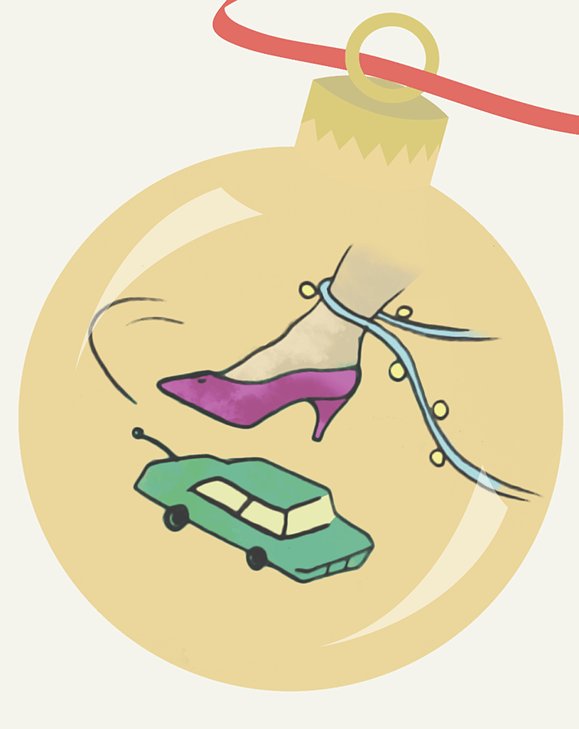
- Don't go up to the loft when you're alone in the house - have someone on hand to pass boxes down to
- Don't rely on standing on chairs, stools and sofas when decorating high branches of the Christmas tree - invest in a proper stepladder
- Don't be tempted to buy an oversized tree - you'll end up having to saw the top off, creating unnecessary risk
- Be careful when opening presents - you'll need scissors and maybe even a screwdriver to tackle tricky packaging
- Keep on top of clutter and discarded gift wrappings - toys, debris and trailing wires underfoot can lead to slips and trips, especially when elderly relatives are around
- Keep lights on in hallways at night to help overnight guests navigate their way to the bathroom without tripping over
- When playing interactive games on Wii, Playstation or Xbox, make sure you've left enough space around you and be sure to use the wrist straps on hand-held controllers
For hints and tips on general safety at Christmas visit RoSPA's website.
Christmas food and drink safety
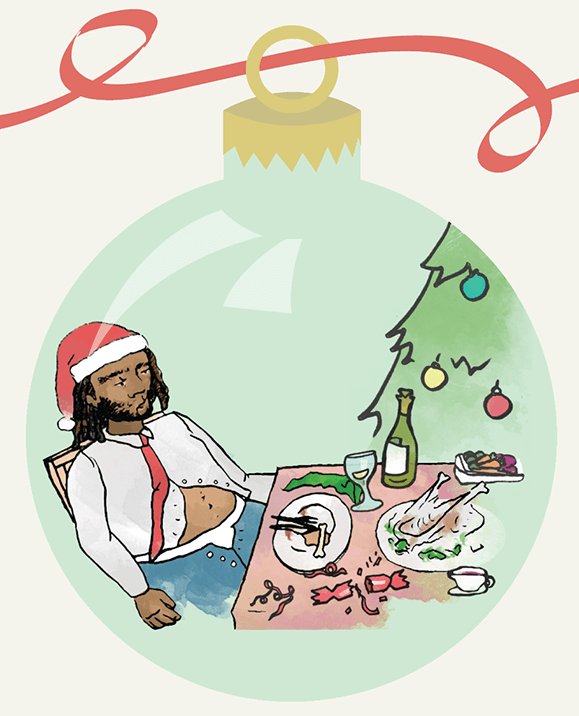
- The last thing you want to do at Christmas is give yourself or your guests food poisoning - all too easy to do with a poorly defrosted or undercooked turkey. Check defrosting and cooking times well ahead of the day to help with planning timings. The NHS has this helpful guide to cooking the perfect turkey
- Bear in mind that when the oven is full, food takes longer to cook - so you may need to add a little extra to cooking times
- Encourage visitors to stay out of the kitchen, or at least out of the chef's way when he or she is dealing with hot ovens and sharp knives
- Don't leave food out on buffets for hours on end - cover and refrigerate anything which could spoil, ideally within an hour of bringing it out of the fridge
- Watch your alcohol consumption - it's easy to lose count of how many drinks you've had if you're at home or visiting friends
- Take a day's break from alcohol between events to give your liver a chance to recover
- Alternating between alcohol and soft drinks can help you stay in control while still having fun
- Don't forget to take account of the alcohol in puddings such as sherry trifle, especially when driving
The Food Safety Agency has useful advice on eating safely at Christmas.
Christmas and children
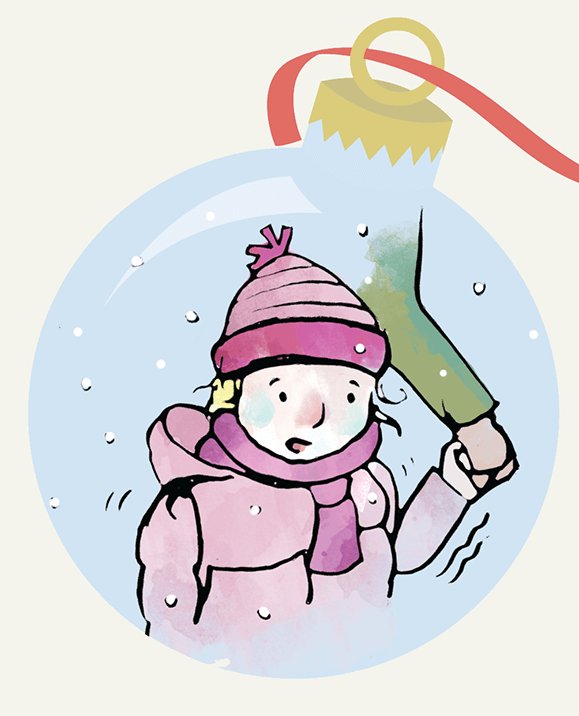
- Be wary of choking hazards, particularly with Christmas decorations and novelties from crackers, which don't have to comply with strict rules governing the sale of toys for use by children
- Holly and mistletoe are poisonous plants, with the berries posing the most danger. Keep them out of reach of children and pets. A dose of 20 holly berries could be fatal for a child
- Make sure your house is child-friendly, especially if you don't normally have children around. Keep small and fragile items up out of reach
- Children will be extra excitable at this time of year, and it's easy to lose track of them in a house full of people. Make sure small children have a nominated adult keeping an eye on them
- Check guidance on packaging to make sure toys given as presents are age-appropriate
- Consider taking portable safety equipment such as stair gates with you when taking very young children to stay with family
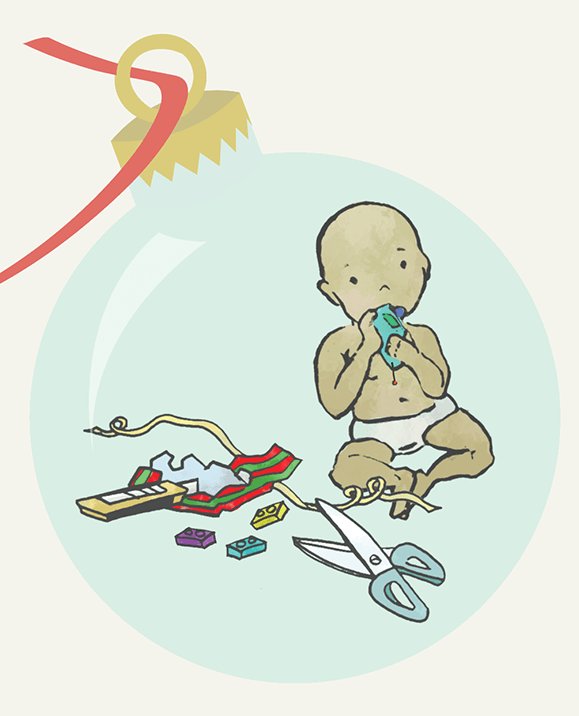
Stay safe at the office Christmas party
We all enjoy the end of year office party, but accidents happen. Keep yourself safe during the festivities with our advice on staying safe.
Drink safe
- Make sure you've had something to eat before you head out - alcohol will hit the bloodstream faster on an empty stomach
- It's worth alternating soft drinks with alcohol (especially if the boss is around). That way you can still enjoy yourself but it'll help you stay in control
- You may be drinking unfamiliar drinks, so make sure you're aware how strong they are
- Don't leave your drink unattended - someone might think it's funny to spike it with extra alcohol
- Avoid topping up drinks before you've finished the glass - it makes it much harder to keep track of how much you've had
- If you're driving the morning after a party, remember that every unit of alcohol takes a minimum of an hour to pass through your bloodstream once you've stopped drinking
- Drinkaware have a handy app which allows you to record your drinks and keep tabs on the number of units you've consumed
Watch out for hazards at the party
- Some of the most frequent accidents we encounter over the festive season are slips and falls on wet dancefloors and spilled drinks. If you spot a wet floor, let a member of staff know so it can be mopped up
- Likewise, we often hear from people who've been hurt by broken glass. Keep an eye out and if you spot broken glass, report it and keep the area clear until it's been swept up
- Beware peer pressure - we've all been tempted to do something silly because we've been egged on by others. It's hard, but try to assess the risks of what you're doing. Dancing on tables may not be your best move!
- Keep an eye out for other dancers on the dancefloor - we've had reports of people suffering painful injuries and even broken legs from being knocked over by overly enthusiastic colleagues
- Avoid confrontations - sometimes people who've had too much to drink can become argumentative or even aggressive. Stay calm and don't rise to the bait
Travel home safely
- Think ahead about how you're going to travel home - keep a note of the last train time and have a reputable taxi number handy. Don't be tempted to take an unlicensed and unbooked mini cab
- Ice and snow underfoot can be treacherous, so bring a pair of flat shoes for the journey home. Even if it's dry, high heels can pose an extra challenge after a drink
- Stand well back from the platform edge if you're travelling home by train or tube - even if you're not drunk, others may be
- Don't walk home alone - it's safer to invest in a pre-booked cab
Safety while out and about this festive season
Travel and shop safe this Christmas with our advice and tips on staying safe while out and about.
Ice and snow
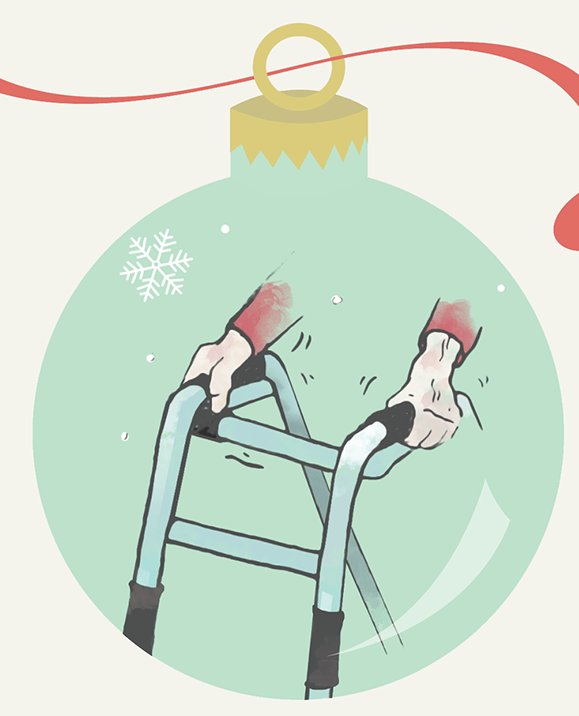
- If bad weather sets in, keep a close eye on the weather forecast and pay attention to weather warnings. Family and friends will understand if you have to reschedule plans to avoid travelling on icy, snowy roads - and there's always Skype as a back up
- Read up on how to drive safely in the ice and snow. The RAC has a great guide to winter driving
- Keep your pathways and drive clear of snow and ice - it's worth investing in a large bag of rock salt
- Don't use boiling water to melt ice - it'll refreeze and make surfaces even more slippery
- Wear appropriate footwear with soles that grip if you're out in bad weather. You can always carry party shoes in a separate bag!
- When snowballing, have a no-stones rule and don't pack snowballs too tightly - they can do serious damage
- Sledging can be fun, but take care to avoid sledging towards trees or other solid objects and beware of steep or uneven ground
Christmas driving
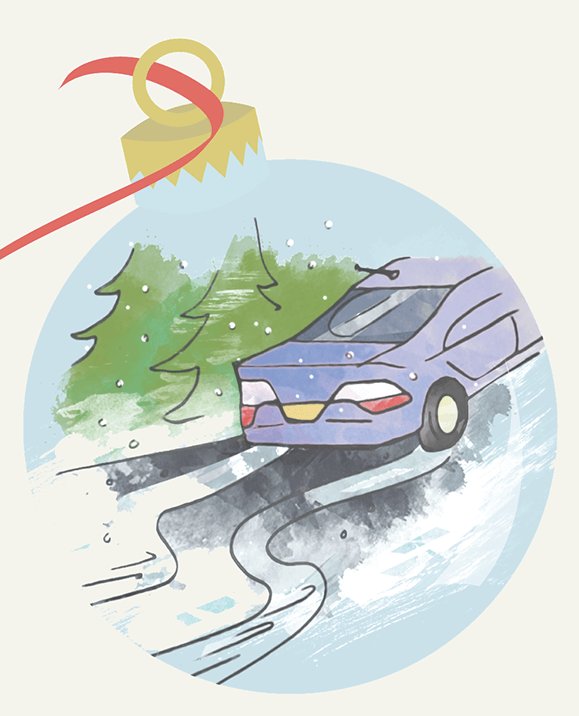
- Driving in super busy Christmas traffic can be stressful, increasing the risk of accidents. If possible plan to avoid busy times by setting off early in the morning or later in the evening
- Consult online traffic guides before setting off. Google Maps has live traffic information. and the Highways Agency records planned motorway roadworks
- Be mindful of drinks consumed the night before when driving at Christmas. When the evening's over, allow at least an hour for every unit consumed before you get behind the wheel
Christmas shopping
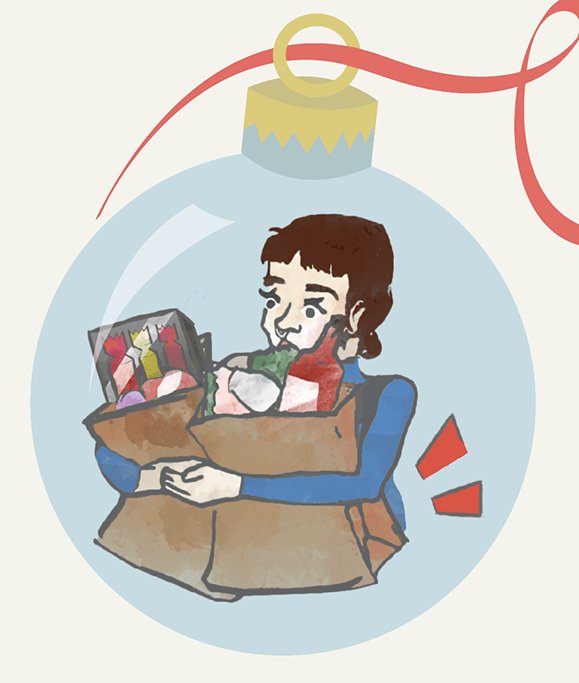
- Be careful not to place strain on your back when Christmas shopping - take a pitstop to drop bags off at the car halfway through the day. Alternatively, wear a rucksack to spread the load and keep hands free
- Busy shopping centres can be very stressful, particularly when shopping with small children. Keep them close, but give them a note with your name and mobile phone number in case they get separated from you
- Stay calm and don't rush - stress leads to accidents. It's not the end of the world if you don't find the perfect gift! Shop online if you find it too stressful to cope with the crowds